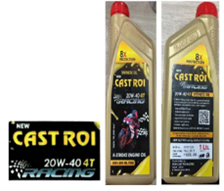 In a peculiar recent trademark dispute between Castrol Limited vs Rajesh Kumar Tuteja, trading as Krishna International and Anr [CS(COMM) 616/2023], the Delhi High Court recently held that the Defendants’ registration of the mark “Newcast Roi Racing” is in bad faith. Both the registration and use of the mark by the Defendants demonstrate a deliberate attempt to capitalise on the goodwill and reputation of the plaintiff’s mark “CASTROL”.
In a peculiar recent trademark dispute between Castrol Limited vs Rajesh Kumar Tuteja, trading as Krishna International and Anr [CS(COMM) 616/2023], the Delhi High Court recently held that the Defendants’ registration of the mark “Newcast Roi Racing” is in bad faith. Both the registration and use of the mark by the Defendants demonstrate a deliberate attempt to capitalise on the goodwill and reputation of the plaintiff’s mark “CASTROL”.
In this case, Castor Limited (“Plaintiff”) asserted that the plaintiff is a member of the British Petroleum group of companies. The plaintiff holds exclusive rights to numerous trademarks, including the prominent “CASTROL” mark and the device mark ![]() . The plaintiff’s mark CASTROL serves as the plaintiff’s signature and has been globally utilised since 1909 on a wide range of products, but most notably on engine oils and lubricants. The wide array of trademark registrations for the mark “CASTROL” and its variants worldwide, including India, underscores the plaintiff’s brand identity and market presence. This extensive historical usage underlines the mark’s significant heritage and its established association with the plaintiff in the minds of consumers worldwide.
. The plaintiff’s mark CASTROL serves as the plaintiff’s signature and has been globally utilised since 1909 on a wide range of products, but most notably on engine oils and lubricants. The wide array of trademark registrations for the mark “CASTROL” and its variants worldwide, including India, underscores the plaintiff’s brand identity and market presence. This extensive historical usage underlines the mark’s significant heritage and its established association with the plaintiff in the minds of consumers worldwide.
Furthermore, the plaintiff adopted distinctive packaging and labelling that significantly enhanced the visual appeal and recognition of their products. Additionally, these labels and marks are the original artistic works of the plaintiff and entitled to protection under the Copyright Act, 1957. In August 2023, the Plaintiff’s Indian representative learned that Defendant No.1, Rajesh Kumar Tuteja, and Defendant No.2, Seema Tuteja, have a familial relationship and are collectively engaged in the business of manufacturing and marketing the sale of engine oil and lubricants bearing the impugned mark.
that significantly enhanced the visual appeal and recognition of their products. Additionally, these labels and marks are the original artistic works of the plaintiff and entitled to protection under the Copyright Act, 1957. In August 2023, the Plaintiff’s Indian representative learned that Defendant No.1, Rajesh Kumar Tuteja, and Defendant No.2, Seema Tuteja, have a familial relationship and are collectively engaged in the business of manufacturing and marketing the sale of engine oil and lubricants bearing the impugned mark.
The plaintiff’s grievance arises from the Defendants’ usage of the impugned mark “newcast roi racing” and the manner in which the impugned mark has been adopted on the label of the products sold by the Defendants. Defendant No.1, despite holding a valid registration for the mark “newcast roi racing,” has been engaged in deceptive practices that undermine the integrity of trademark law.
The defendants’ adopted the trademark ![]() on their product’s label and packaging
on their product’s label and packaging  that is deceptively similar to the Plaintiffs’ mark “CASTROL“. The Defendants have craftily manipulated the presentation of their mark by strategically altering the typography, diminishing the prominence of “new” and unduly accentuating “Castroi,” with “Racing” positioned less conspicuously. The Defendants muddled the distinction between the plaintiff’s renowned “Castrol” mark and their mark “Castroi,” both utilised for identical goods, i.e., engine oil and lubricants.
that is deceptively similar to the Plaintiffs’ mark “CASTROL“. The Defendants have craftily manipulated the presentation of their mark by strategically altering the typography, diminishing the prominence of “new” and unduly accentuating “Castroi,” with “Racing” positioned less conspicuously. The Defendants muddled the distinction between the plaintiff’s renowned “Castrol” mark and their mark “Castroi,” both utilised for identical goods, i.e., engine oil and lubricants.
On 4th September 2023, the Court granted an ex-parte ad interim injunction restraining the Defendants from using the impugned marks and labels and appointed a Local Commissioner. The Local Commissioner made some significant seizures of the infringing products. Additionally, the plaintiff’s investigation revealed that Defendant No.1 is a habitual infringer and is involved in selling counterfeit products of well-known marks such as ‘HONDA’ and ‘AMARON’.
In addition, recognising the gravity of this infringement, a separate order for the cancellation of the defendant’s mark has already been issued in a rectification petition C.O. (COMM.IPD-TM) 208/2023, and the Defendant No.1 had no lawful basis to defend the dishonesty inherent in his actions.
The defendants argued that the impugned marks were adopted without knowledge of the plaintiff’s registration status. Using impugned marks and the container’s design was undertaken without any intention to deceive the consumers or capitalise on the plaintiff’s established reputation. The bottles and containers used by the Defendants are standard items readily available on platforms such as India Mart, indicating no deliberate effort to mimic the plaintiff’s product presentation. In addition, the packaging of the Defendant’s product and the containers contains a disclaimer mentioning that “This Product is available. This is not a copy of CASTROL. We have this brand registered with the government. 100% legal”. The disclaimer serves as a clear indication that there was never any intention on the part of the defendants to suggest that their product was associated with or endorsed by the plaintiff.
The Order of the Delhi High Court
The Single Judge bench of the Delhi High Court observed and held as follows:
(i) The comparison of the plaintiff’s mark and the Defendant’s mark demonstrates that although the defendants’ mark may seemingly appear distinct from the plaintiff’s, it has been strategically presented in a manner that creates a deceptive similarity to the plaintiff’s registered trademark. The defendants engaged in a calculated manipulation of their trademark’s presentation, employing a strategic alteration of typography to mirror the plaintiff’s established “CASTROL” mark closely. By diminishing the prominence of the word “new” and disproportionately emphasising “cast roi” with “racing” relegated to a less prominent position. The defendants have significantly obscured the distinction between the well-recognised “CASTROL” mark of the plaintiff and their mark “Castroi,” despite both being used for identical goods. This intentional shift in the visual representation induces confusion among consumers, eroding the distinction between the plaintiff’s mark “CASTROL” and the Defendants’ mark “Castroi”.
(ii) Since there is no objection to the grant of a decree of injunction, the suit is decreed in favour of the plaintiff, and the plaintiff shall also be entitled to destroy the infringing goods seized by the Local Commissioner in accordance with the law.
(iii) The Defendants’ deceptive strategies warrant an award of damages. The Defendants claim innocence and rely on a disclaimer asserting no affiliation with the ‘CASTROL’ trademark. The disclaimer appears to be a flimsy afterthought rather than a genuine effort to prevent confusion. Thus, the Defendants’ actions suggest a pattern of behaviour aimed at capitalising on the plaintiff’s goodwill and market position.
(iv) The adoption of similar packaging and labels and the sale of products in bottles and containers of designs nearly identical to those used by the plaintiff. The plaintiff’s assertion that Defendant No.1 is a habitual infringer, evidenced by their unauthorised use of other well-known trademarks such as ‘HONDA’ and ‘AMARON’, completes the narrative of deceit. The defendants’ pattern of behaviour underscores their engagement in selling counterfeit goods and highlights a systematic intent to pass off their products as those of recognised brands, exploiting the goodwill and reputation those brands have cultivated.
In light of the above analysis, the Court concluded that the Defendant’s conduct not only warrants but also necessitates the imposition of both costs and aggravated damages. Thus, in addition to the order passed above, taking into account the entire facts and circumstances presented in this case, the Court awarded damages amounting to INR.5,00,000 in favour of Plaintiff and INR.7,00,000 (break of which is specified in the decision) towards the cost of litigation to be paid by Defendant No.1 to the plaintiff.
This order of the Delhi High Court is a significant win for Castrol in protecting its intellectual property rights. The decision reinforces the principles of trademark law that protect against counterfeiting and unfair competition.
Authors: Manisha Singh and Angelina Talukdar
First Published By: Lexology here



